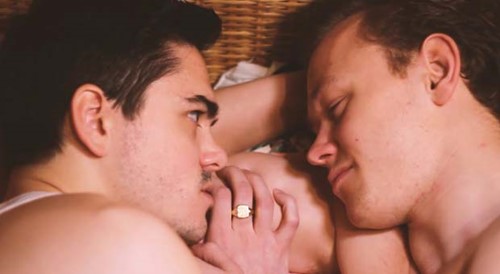REVIEW: ‘ONCE A YEAR ON BLACKPOOL SANDS’ – CANAL ST ONLINE
★★★★★
Once a Year on Blackpool Sands by Karlton Parris is a craftily constructed play, with several interwoven strands that come together, ultimately uniting all the characters in a show of defiance against the social mores of the day. It is set in a Blackpool boarding house in the summer of 1953 with the coronation as a backdrop. It’s part comedy, part love story, with a serious end and based on a true story. All six characters are excellently portrayed.
The boarding house is run by Gladys, played by Wendy Laurence James, whose evocation of a Blackpool landlady of the period is really good. “Red” Ethel, her communist mother, is played by Linda Clark. Ethel is recovering from a stroke, drinks too heavily, holds her daughter in very low esteem, and expresses her resentment in very colourful language. The characterization is spot on. The family is completed by Gladys’s daughter Maureen who at first appears to be a bit of a lummox, but the part (played by Mollie Jones) is developed very well and she ends up quite the opposite.
The house has a reputation of having liberal attitudes for those in the know, and into this little love/hate triangle three paying guests are thrust.
Two Yorkshire coal miners, Eddy and Tommy played by Kyle Brooks and Macaulay Cooper, are on holiday for the Wakes Week pit closure. They are lifelong friends from being at school, and secret lovers, only managing to be so just this once a year. Eddy’s drunken father used to beat the queer out of him from the age of 6. Tommy has had an easier ride, but lives in constant fear of being exposed and is resigned to marriage. The duality of their lives is developed with skill, and for Eddy this week is his turning point – he’s not going back.
The final guest, Mr. Elbridge (Dominic McCavish), is a secret transvestite, who like Eddy and Tommy, lives for this once a year to express himself. The character has depths which are gently and tenderly played.
The play is based on the story of a real Tommy and Eddy, as divulged to Karlton Parris 30 years ago.
Eddy and Tommy arrive at the guest house determined to make the most of their time. Gladys has genteel pretentions of grandeur but surmises the situation instantly. As the tale unfolds Eddy shows her a newspaper where he’s been reported for gross indecency – hence his intention of never going back. Gladys is unfazed, but for Tommy it’s a disaster.
Mr. Elbridge is battling with his three feminine personas, and takes advice coming from the unlikely direction of Ethel. He’s determined to walk down the promenade whilst dressed, and Ethel offers makeup tips and dress choices. Gladys wonders why he doesn’t up-sticks and move to Denmark, where he’d be happy, but he’s married and can’t leave his wife.
Maureen is tired of living in the boarding house where she’s treated pretty much as a skivvy, and she and Eddy fantasize about going to America. He’s serious about it, but she sees it is just a fantasy and already has plans to liberate herself by moving to Liverpool. Gladys knows she’s not been a good mother and the scenes where she, Ethel and Maureen confront history are heart-rending.
In 1953, male homosexuality was completely illegal and men had to be very careful if they wanted to avoid prison. Eddy’s “crime” was just holding hands with someone – something that today beggars belief. Whilst transvestism per se wasn’t illegal, it was lumped in with being homosexual and men were hounded in the same way.
The play develops the huge stigma that Eddy, Tommy and Mr. Elbridge must bear in a skillful way and at the end, supported by Gladys, Ethel and Maureen they march down the promenade as themselves. It’s a powerful ending, with people throwing things and spitting at them.
Paul Schofield for Canal St Online.
Originally published here: https://www.canal-st.co.uk/box-office/canal-st-reviews/once-a-year-on-blackpool-sands

